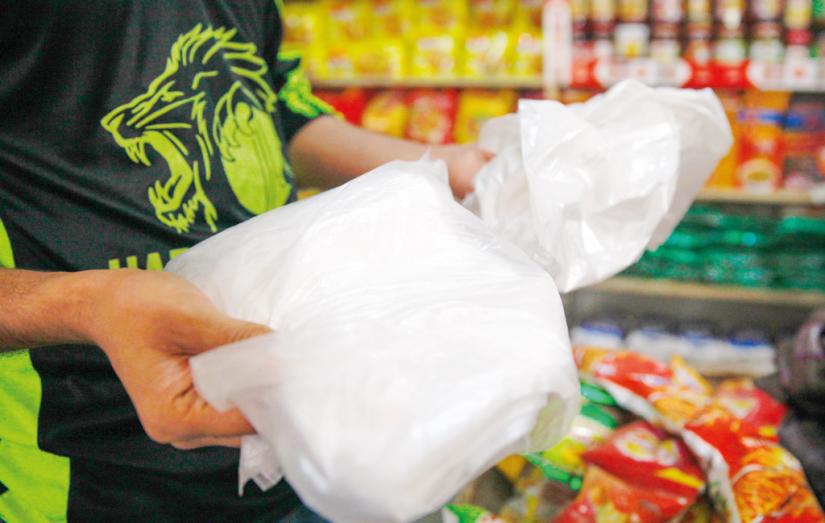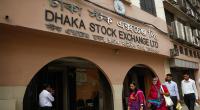 Despite getting banned in 2002, polythene has managed to stick around in the Bangladeshi markets as producers, wholesalers, suppliers, and consumers all continue to use polythene bags indiscriminately.
Despite getting banned in 2002, polythene has managed to stick around in the Bangladeshi markets as producers, wholesalers, suppliers, and consumers all continue to use polythene bags indiscriminately.
While the government agencies claim the sustained use stems from a lack of consciousness and alternatives, experts claim the true reason is a lack of the ban’s enforcement.
During the investigation of this report, it was painfully obvious that the ban had no effect whatsoever on the everyday use of polythene bags for grocery shopping.
STATE AGENCIES SAY NO ALTERNATIVES
Begum Rubina Ferdoushi, director (monitoring and enforcement) at the Department of Environment, said: “It is not possible to eliminate polythene bags from the market without making the public aware of the threat it poses. Another problem is that we have no viable alternatives.
“We have two magistrates and only several officers across the country with magistracy power. This is insufficient to carry out any regulatory inspection while we remain occupied against more prolific polluters like brick kilns and heavy industries.”
She claimed that the Department of Environment needs support from police and Rapid Action Battalion (RAB) to conduct mobile court, and mentioned the difficulty caused when local politicians prevent them from carrying out their duty.
The Environment and Social Development Organization (ESDO), a environment advocacy group, campaigned to ban the polythene back in 2002.
Dr Shahriar Hossain, secretary general of ESDO, said: “After the ban, polythene was not seen until 2006. Since 2007, law enforcement agencies grew lax on enforcing the ban, and polythene came back. Making the people understand the dangers of polythene is important, but the message will go best if the product is taken off the market entirely, citing the dangers and the ban.”
BUT THERE IS AN ALTERNATIVE
Despite claims of no alternatives to polythene bags existing, Bangladesh has made tremendous inroads with native products. Dr Mubarak Ahmad Khan invented a shopping bag made with organic jute fibres and marketed it as “Sonali Bag” to national and international acclaim.
He said: “If we use all our jute to produce Sonali Bags, we can meet one-fourth of the global demand. It is a foolish to say there are no alternatives.”
Dr Mubarak, who serves as a scientific adviser of the Bangladesh Jute Mills Corporation (BJMC), said the government is looking to produce 100,000 pieces of Sonali Bag per day. He also noted that what matters is that the government is willing and is eager to smooth the operational process.
THE COMEBACK OF POLYBAGS
According to local entrepreneurs, there are about 100 polythene wholesalers located in Chawk Bazar, who openly conduct their business. Some are producers themselves, and others buy it from factories in Kamrangirchar. There are over 50 such factories in Kamrangirchar.
Rana, one of the wholesalers, said: This is the only business I have known since my childhood. I have nothing aside from this. I know it is an environment hazard and responsible for Dhaka’s waterlogging, but I have never seen any action against polythene.”
Dr Abdullah Al Mamun, deputy director (monitoring and enforcement) at the Department of Environment, said: “As we have a shortage of manpower, police can seize polythene, arrest illegal traders and producers and file a case according to the law.”
Muntasirul Islam, deputy commissioner (Lalbagh Division) at Dhaka Metropolitan Police (DMP), said: “We operate drives and arrest when we are informed, but we need the Department of Enviroment to file cases and their assistance to point out what kind of polythene is illegal or not.”
According to the Environment Court Act, 2010, a Department of Environment officer authorized by the director general can file a case under the Environmental Conservation Act, 1995. Besides, mobile courts can take action against illegal polythene under the same act.
LEGAL STATUS
According to Section 6 (A) of the Environment Conservation Act, 1995, the government can impose ban on production, import, marketing, display for sale, store, distribution, commercial transportation of commercial use of polythene if found harmful for the environment by gazette notification.
Violators will be fined a minimum Tk50,000 to maximum Tk one million or minimum one year to maximum 10 years of imprisonment, or both depending on the circumstances.
Since the ban in Sept 2002, using and producing polythene is a criminal offence.
On Jul 23, 2008, the Ministry of Environment issued a gazette issuing permission to produce and use polythene only for transporting fish larvae, and packaging mushrooms and other food products. The notification stipulates a Bangla label on the package announcing that the packaging is not for any other use and will be considered illegal.
The law requires manufacturers to take clearance from the Department of Environment to produce polythene for packaging purposes, the only form of polythene allowed in Bangladesh. It remains to be known whether the Kamrangirchar factories have any such permissions.
 Business
Business
41281 hour(s) 27 minute(s) ago ;
Evening 08:21 ; Wednesday ; Jul 02, 2025
How are banned polythene bags still in the market?
Send
Mehedi Al Amin
Published : 04:00, Dec 08, 2019 | Updated : 04:00, Dec 08, 2019
Published : 04:00, Dec 08, 2019 | Updated : 04:00, Dec 08, 2019
0 ...0 ...
/srj/
Topics: Top Stories
- KOICA donates medical supplies to BSMMU
- 5 more flights to take back British nationals to London
- Covid19: Rajarbagh, Mohammadpur worst affected
- Momen joins UN solidarity song over COVID-19 combat
- Covid-19: OIC to hold special meeting
- WFP begins food distribution in Cox’s Bazar
- WFP begins food distribution in Cox’s Bazar
- 290 return home to Australia
- Third charter flight for US citizens to return home
- Dhaka proposes to postpone D8 Summit
Unauthorized use of news, image, information, etc published by Bangla Tribune is punishable by copyright law. Appropriate legal steps will be taken by the management against any person or body that infringes those laws.
Bangla Tribune is one of the most revered online newspapers in Bangladesh, due to its reputation of neutral coverage and incisive analysis.
F R Tower, 8/C Panthapath, Shukrabad, Dhaka-1207 | Phone: 58151324; 58151326, Fax: 58151329 | Mob: 01730794527, 01730794528






